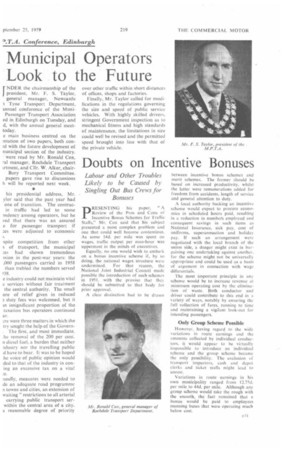DI.T.A. Conference, Edinburgh
Page 65

If you've noticed an error in this article please click here to report it so we can fix it.
Municipal Operators • Look to the• Future
rNDER the chairmanship of the president. Mr. F. S. Taylor, general manager, Newcastle Tyne. Transport Department, annual conference of the MuniPassenger Transport Association ed in Edinburgh on Tuesday, and d, with the annual general meettoday.
e Main business centred on the :ntation of two papers, both con. td with the future development of nunicipal section of the industry. were read by Mr. Ronald Cox, manager, Rochdale Transport Lrtment, and ClIr. W. Alker, chairBury Transport Committee. papers gave rise to discussions h will be reported next week.
his presidential address, Mr. ylor said that the past year had one of transition. The con tracin traffic had led to some mdency among operators, but he ved that there was an assured e for passenger transport if es were adjusted to economic ;.
spite competition from other s of transport, the municipal :.es had shown tremendous ision in the post-war years: the ,000 passengers carried in 1958 than trebled the numbers served 138.
e industry could not maintain vital c services without fair treatment the central authority. The small tire of relief given in reduced duty fees was welcomed, but it an insignificant proportion of the taxation bus operators continued ar.
.-.re were three matters in which the try sought the help of the Govern. The first, and most immediate, he removal of the 200 per cent. n diesel fuel, a burden that neither -idustry nor the travelling public
d have to bear. It was to be hoped he voice of public opinion would ded to that of the industry in coning an excessive tax on a vital ;e.
:ondly, measures were needed to de an adequate road programme rt towns and cities, an extension of waiting " restrictions to all arterial carrying public transport serwithin the central area of a city, a reasonable degree of priority over other traffic within short distances of offices, shops and factories.
Finally, Mr. Taylor called for modifications in the regulations governing the size and speed of public service vehicles. With highly skilled drivers, stringent Government inspection as to mechanical fitness and high standards of maintenance, the limitations in size could well be revised and the permitted speed brought into line with that of the private vehicle.




















































































































